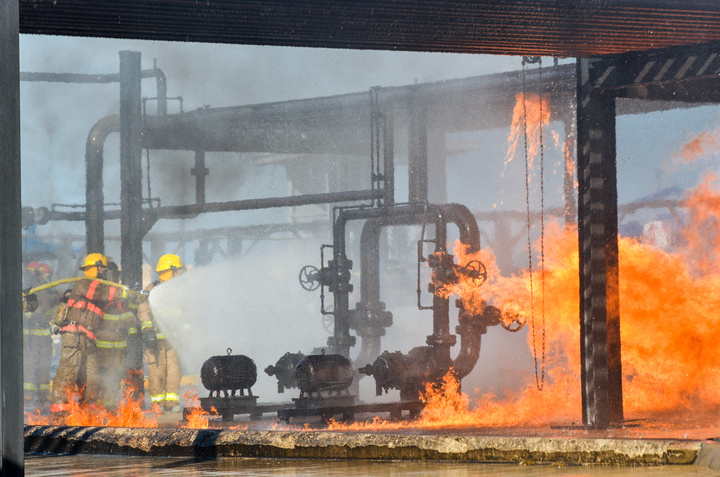PRACTICE areas
Explosion Injuries

When people hear the word “explosion,” they often think of something that they saw in a movie or on TV. Of course, explosions happen in real life, and they occur more frequently than most people might think. Explosions can be devastating and the consequences are often severe, including catastrophic injuries or death. If you survive an explosion accident, you and your family will likely be impacted, both physically and emotionally, for the rest of your lives.
The economic harm can also be devastating. In many cases, medical bills alone can top seven figures, and the survivor may not be able to return to work. The survivor may also require extensive future healthcare, including ongoing treatment, rehabilitation, and home care assistance. For victims and their families, these expenses often result in severe financial hardship.
Having represented clients in explosion-related litigation in Alabama for over 30 years, our team of Birmingham personal injury attorneys and staff at Glenda Cochran Associates are experienced in handling these cases, which are ordinarily very complicated and nearly always require the testimony of numerous expert witnesses.
What Causes Explosions?
Explosions are caused by a range of complex reactions which result in the rapid expansion of gas and energy. In the modern world, we are virtually surrounded, both at home and work, by appliances, machinery, engines, fuel, chemicals, pipelines, and power sources that can serve as the catalysts for an explosion.
Many explosions occur from propane or natural gas leaking from buried pipelines, tanks, valve lines in stoves, furnaces, and hot water heaters. Explosions also often happen in industrial, construction, and excavation settings. For example, a spark or other ignition source may set off an explosion in or near containers, equipment, vehicles, and pipelines containing fuel and other flammable or combustible materials, such as gasoline, natural gas, propane, oil, chemicals, and even sawdust. Digging equipment may rupture an underground pipeline containing such materials which then ignite. Explosions can also occur from chemical reactions or where equipment operates under high pressure, such as boilers and furnaces.
In addition, a high current electrical fault can create an “electrical explosion” by forming a high energy electrical arc flash that rapidly vaporizes metal and insulation material. This hazard is a danger to persons working near energized equipment, such as switchgear. The temperature from an electrical arc flash is more that four times hotter than the sun.
What are the Effects of
Explosion Injuries?
An explosion can cause property damage, severe injuries, or death, regardless of whether the explosion occurs indoors or out.
The pressure waves emanating from an explosion can directly harm individuals in the vicinity of an explosion’s source, including severe external and internal injuries. Blast waves can also cause indirect injuries in which the individual falls or is knocked off their feet and impacts solid surfaces and structures such as sidewalks, walls, mechanical equipment, or vehicles. Flying debris can also result in traumatic brain injuries, amputations, penetrating injuries, and eye injuries, including blindness.
Explosions can cause fire or chemical burns. In addition, dust, smoke, particulate matter, and toxins released into the air during an explosion can result in inhalation injuries that can damage the lungs and cause asthma and other breathing problems.
In addition to physical injuries, it is well known that explosions can have severe and long-lasting emotional effects. Post-Traumatic Stress Disorder (PTSD) is common among explosion survivors. The condition is complex and debilitating, affecting all facets of an individual’s life, as well as the lives of their loved ones.
Alabama Explosion Injury Claims
Alabama law generally allows a victim who is injured in an explosion to recover damages from other parties whose failure to exercise reasonable care or whose reckless or intentional misconduct caused the explosion. If the victim is killed, Alabama law authorizes the victim’s personal representative or dependents to bring an action for wrongful death.
If an explosion occurs at work, an employee who is injured or killed is generally entitled to workers’ compensation, an amount for lost wages, and benefits covering medical expenses, regardless of fault. In such cases, there are legal restrictions on the liability of the victim’s employer and co-workers beyond that established under workers’ compensation laws. The victim is often entitled, however, to recover damages from other, third parties whose misconduct caused or contributed to the explosion. For example, an injured worker may be entitled to recover against contractors or subcontractors whose work on a jobsite results in an explosion. An injured worker may also bring claims against companies that designed, manufactured, sold, installed, serviced, or inspected equipment or a product involved in a workplace explosion.

Economic and Non-Economic Damages
Victims injured in an explosion are entitled to seek damages for both economic and non-economic losses. Medical bills, lost wages, and lost earning capacity are examples of economic losses. Emotional distress, physical pain and suffering, and a reduced quality of life are types of non-economic damages that are hard to quantify but are subject to recovery in amounts set by a jury. The spouse of a victim injured may also be entitled to damages for loss of consortium.

Punitive Damages
It is possible to recover punitive damages in cases where the actions of the party responsible for the explosion were especially egregious, to “punish” them and prevent them and others from engaging in such misconduct in the future. In addition, in Alabama, all damages for wrongful death are considered punitive in nature. As such, they are determined by a jury in light of the culpability of the defendant’s conduct, or how “bad” it is, not by economic considerations such as the victim’s age and established earning capacity. These damages also serve as a warning to others not to engage in similar conduct.
We’ve been defending burn injury victims for 30 years
verdicts and settlements
OUR
RESULTS
We Can Help You with Your Explosion Injury Lawsuit
The team at Glenda Cochran Associates is here to assist you and your family with a free no-obligation case evaluation for explosion accidents in Alabama and elsewhere. It may be difficult to take the time to contact an attorney immediately after you or a family member has been seriously injured or killed in an explosion. Doing so, however, is extremely important since it may be the difference between winning or losing your case.
Explosion cases are complex, and it may not be clear at first just who and what caused the explosion. As a result, the time immediately following the accident becomes critical to the preservation of evidence, before the scene is cleaned up, and the involved equipment is repaired or discarded. Additionally, it is important to interview witnesses soon after an incident, as memories can fade over time. Our decades of experience in explosion cases allows us to know what evidence to look for and how to ensure it is secured. Contact us today.
Request a
callback
Explosion Injuries FAQsExplosion Injuries FAQsExplosion Injuries FAQs
Among the most common injuries suffered in explosions are:
- Lung injuries
- Burns
- Head injuries, including traumatic brain injuries (TBIs) and concussions.
- Damage to the eyes and ears.
- Internal bleeding
- Abdomen perforation
- Amputation
Yes. Failures, malfunctions, and defects in appliances, products,and equipment are common causes of explosions, both at home and in the workplace. Product liability law generally allows victims to recover damages from product manufacturers and sellers for defects arising from the product’s design, the manufacturing process, or a failure to include proper instructions or warnings and where such defect causes personal injury or death.
An explosion is a rapid expansion of gases. Many explosions occur when gases are exposed to a source of heat- such as fire, sparks, even static electricity – or an increase in pressure. Explosions can also be caused by chemical reactions.